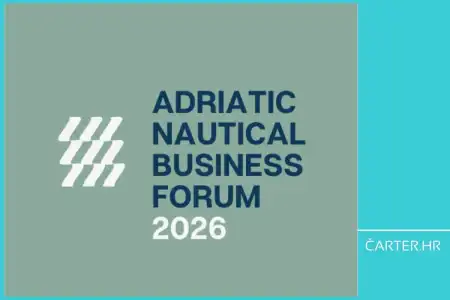
In his new article for čarter.hr, Ivica Žuro dissects our favorite national sport: publicly complaining about prices, tourists, coffee, and our own country. But maybe it’s time to ask ourselves – are we really that bad, or do we just sound like it?
The Chinese say it’s easier to be a dog in times of peace than a human in times of chaos, and there’s also the old curse: may you live in interesting times.
Since we have the privilege of burdening ourselves daily with both important and unimportant matters, it’s necessary to distinguish what might truly have consequences for life in the near or distant future.
It’s not that couple from the Coldplay concert who just happen to work for a company involved in AI data processing and, after their little moment, hired Gwyneth Paltrow as their PR. Granted, there’s a theory that the film based on a true story from the waters around Vis in 2004 didn’t just randomly resurface. In any case, only the protagonists know what the real truth is.
What affects the life of the average citizen of our Lijepa Naša much more is what happens in public finances, which can only and inevitably result in higher taxes or some new complication.
How much is a “good” salary worth?
So, if someone wanted to secure housing, had a good salary and some money to invest - it used to be an “Reka san ne može (I said - can't)” kind of song, and now it just might be possible.
Namely, by introducing stricter criteria, obtaining a loan for people with above-average incomes - who were already more than reliable payers - has been limited in a way that effectively means lower creditworthiness and the possibility of borrowing up to 25% of income.
Furthermore, the monthly debt service-to-income ratio (DSTI) for housing loans must not exceed 45% of net salary, while for non-housing loans the maximum DSTI is 40% with a repayment period of up to 10 years.
These measures were introduced by the central bank to slow down household debt growth and increase financial stability in the face of macroeconomic challenges.
Interestingly, the rise in lending occurred not only alongside falling average interest rates but also with a significant increase in public sector wages, which not only employs nearly 30% of all workers in Croatia but also pays average net salaries up to 300 euros higher than in the private sector.
In the end, the average person longing for a place of their own has found themselves caught in scissors - with one blade being the rising price per square meter, and the other the tightening of loan eligibility.
It’s hard to shake the impression that we’re masters of shooting ourselves in the foot just to prove we’re good doctors.

Expensive, more expensive – Croatia
And if anything illustrates this fact, it is tourism, which is suffering a massive attack coming precisely from within its own ranks – from those who should be promoting it.
No other tourist country publicly communicates its shortcomings, not in a million years. Only we keep saying how expensive we are, and then wonder why we’ve never had more tourists yet never less spending. I don’t know what we expect – for bookings in Croatia to rise the more we repeat that we’re pricier than the rest?!
It’s a schizophrenic situation when, despite public safety, improved connectivity, events, the Mediterranean lifestyle, and a diverse overall offer from Prevlaka to the Danube, we spend days discussing why a decent cup of coffee here costs just a bit more than in Austria or Germany.
The trend of rising prices is not specific to Croatia. It is present in most Mediterranean destinations due to the general increase in inflation and business costs.
Accommodation prices in Croatia are, on average, aligned with Mediterranean competitors, while prices in hospitality venues are much more frequently debated.
It’s not just about our “expensiveness,” but ultimately the fact that life has become significantly more expensive for the average EU citizen, and every euro now gets flipped twice.
According to the latest reports, spending in hospitality venues in Germany has dropped by almost 5%, which in itself is a very telling sign.
Interestingly, according to fiscalization data, wholesale and retail trade in June this year – meaning the pre-season month – had the same amount of fiscalized receipts as in August 2024, which is one of the two peak months of the high season. People are buying and preparing food in apartments, on boats, wherever... In short, €3.2 billion was spent at points of sale in both of those months.
For a country facing a deficit of €1.9 billion, any refill of an almost dried-up well is welcome – as long as it flows from consumption. In light of fulfilling collective agreements and the promised €173 million for pensioners, the news of solid retail earnings is balm for the wound.
On top of that, the state treasury benefits more from trade than from food preparation and service, since the VAT on the former is 25%, and on the latter 13%.

Funds secured. Projects? In the drawer.
Furthermore, the employers’ association’s professional section emphasized that regarding non-refundable funds from the Multiannual Financial Framework (MFF) 2021–2027, we have used only 5.7% of the available money, which in itself is a red alert.
The reasons for this disappointing figure are continuous delays in calls for applications and delays in contracting and approving funds for projects that have already passed the selection. These represent actual jobs and livelihoods funded by EU taxpayers. No one has the right to treat that lightly.
When it comes to drawing non-refundable funds, there is no alternative other than accelerating implementation processes and finding ways to stimulate fund absorption in those sectors that consistently show interest and have ready-to-go projects.
The system must be simplified, and the “fastest finger” approach entirely eliminated – funding should go to the projects that employ the most people, not just those that clicked the fastest.
Productivity? Not on the priority list.
Specifically, many companies from the manufacturing industry were left out in the 2021 call, and if anyone creates added value and employs people year-round – it’s them.
We’re quick to boast about any export success, but when it comes to easing the tax burden, things become much more difficult.
This sector is one of the few that actually invests in improving productivity and business processes – and it should be nurtured.
In light of the fact that the demand for loans among small enterprises in Croatia has dropped from 40% to 28% of the sector – this is particularly significant, because the manufacturing industry cannot remain competitive unless it keeps pace with modern technology and skills.
Categories of trends
- News
- Sale
- Marketing
- SEO
- Web design
- Social media
- Technology
- Regulations
- Management
- Education
- Finances
- User experience
Newsletter
Sign up for the newsletter and receive the latest trends and tips straight to your inbox





